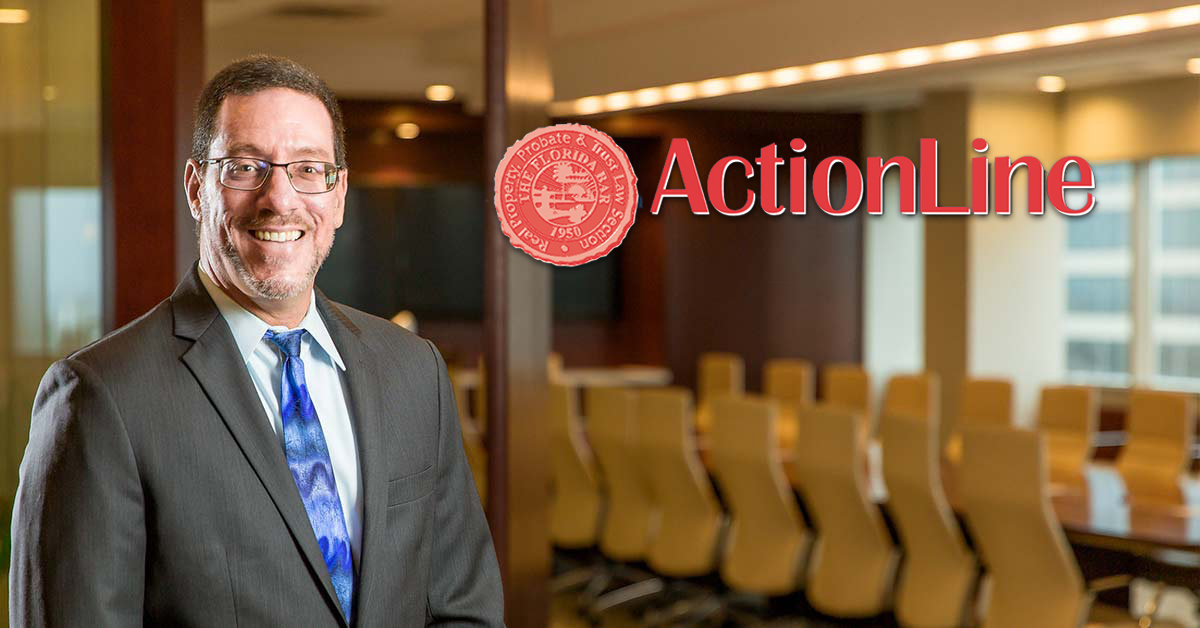“Q&A Interview with Lee Weintraub,” ActionLine
 Q: Lee, how long have you been the chair of the Public-Private Partnership (P3) group at Becker?
Q: Lee, how long have you been the chair of the Public-Private Partnership (P3) group at Becker?
A: I have practiced in the Fort Lauderdale office of Becker since 1999, where I am the Vice-Chair of the Construction Law and Litigation Practice Group and Chair of the Public/Private Partnerships Practice Group. Since 2013, the year in which I drafted Florida’s P3 statute, I’ve chaired the P3 practice group.
Q: What does the P3 group do?
A: The attorneys in the P3 group assist governmental entities and businesses seeking to partner on public facilities. We seek to help governmental units that are always squeezed for funds, yet they face ongoing and sometimes increasing demands for improved infrastructure, schools, civic buildings and other public assets.
Q: How have you been involved in P3 work in Florida?
A: In 2011–2013, I helped draft, negotiate and advocate for the P3 legislation that became law in Florida in 2013. I was involved in all the statute’s subsequent amendments. Subsequently, I created a statewide P3 trade association called the Florida Council for Public/Private Partnerships that brought public and private sector members together to learn and network. Around that time, I founded the P3 Practice Group at Becker, and the rest is history. We have been lead counsel on many projects, some of them very high profile, and it has been a lot of fun.
Q: What is the Florida Council for Public/Private Partnerships?
A: It is a non-profit consortium of public and private sector organizations working together to further P3 opportunities.
Q: I understand you recently were invited to share your P3 expertise with leaders from eight Asian governments in meetings held overseas. Can you please elaborate on your experience?
A: Yes, I was invited by the U.S. Department of Commerce’s Commercial Law Development Program (CLDP) to speak at a series of P3 training workshops on behalf of the U.S. federal government. The workshops were held for representatives of governments of eight Asian countries.
Q: Where were these workshops held?
A: The workshops were held in Nepal and Singapore between September 9 and September 18, 2019.
Q: Who set up the workshops for you?
A: The training workshops were organized through the U.S. Embassies in the eight nations invited to attend.
Q: Did you travel alone?
A: Yes, I did. First time traveling alone on such a big trip — my flights from the start to the end completely circumnavigated the globe! Very cool concept, but boy were those flights long!
Q: What did you seek to accomplish in the workshops?
A: The primary purpose of the workshops was to train Asian countries on how to develop policies and legal frameworks to increase foreign investors’ interest in the South Asian and Southeast Asian P3 infrastructure markets. Most of these emerging countries have or are considering empowering P3 legislation and are now wrestling with how to implement P3s, beginning with promulgating national standards and processes. That is where we came in with the training.
Q: Can you explain in a bit more detail what sort of infrastructure investments you are talking about?
A: Sure, like much of the world, there are constant and mounting needs for improvements to roads, sewers, schools and other public assets. As governments are constantly squeezed for funds, this creates business opportunities for private companies to partner with public entities to fill that void with P3s. In South and Southeast Asia, the primary needs are transportation, water treatment, and social infrastructure (buildings, schools, etc.), but also some unique needs such as energy generation and mining.
Q: What sorts of issues were you presenting in the workshops?
A: We discussed key considerations regarding regulatory requirements, procurement strategies, deal structures and contract negotiations of P3s. In Nepal, we trained their government agency in charge of P3s on how to create regulatory guidelines for procuring P3s. We then spent a day with their Parliament training them on what P3s are, and finished by spending a day with their media to train them on messaging. In Singapore, eight countries joined us for two days of training on how to deal with unsolicited proposals.
Q: Can you summarize how you feel about this unique opportunity?
A: It was extremely humbling to be recruited by the federal government for this opportunity and especially rewarding to meet with foreign governments and teach them how to best meet their needs with P3s through a combination of private financing and ingenuity. P3s will allow these countries to transfer some of the project risks from the public sector to the private sector and leverage the expertise of their private sector partners. These emerging governments are under constant strain from their more developed neighbors, and P3s can provide some much needed autonomy to help these countries progress with less international interference and influence.
This article was originally published in the Winter 2019-2020 issue of ActionLine, a Florida Bar Real Property, and Trust Law Section publication.





